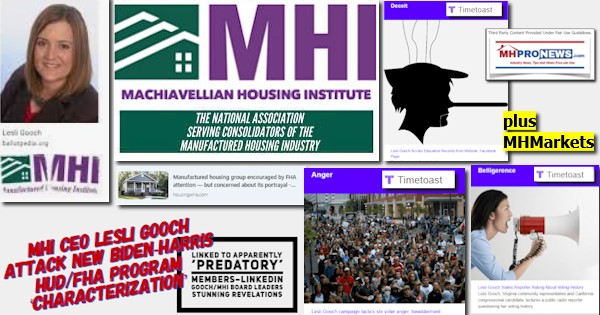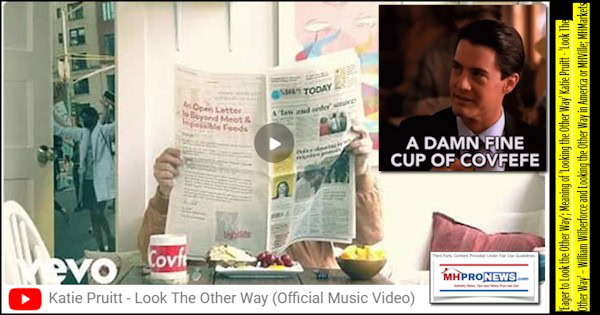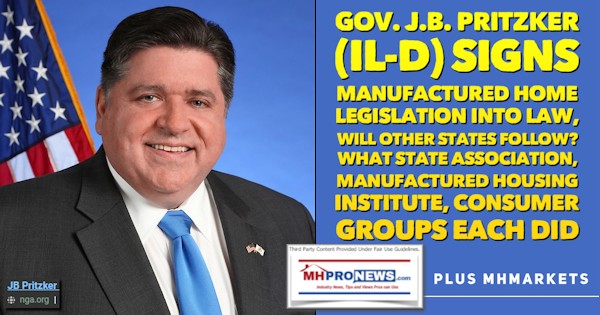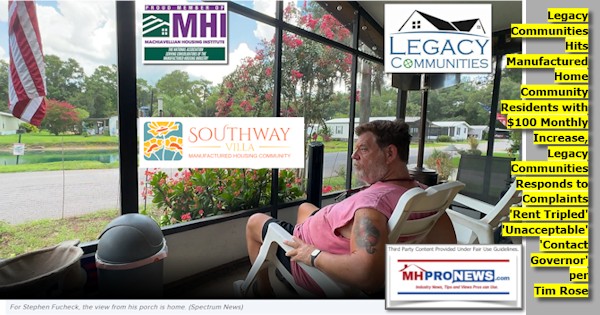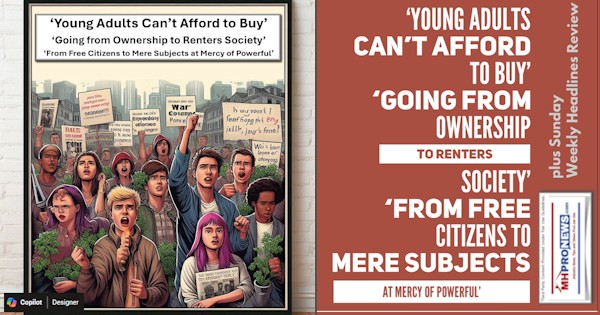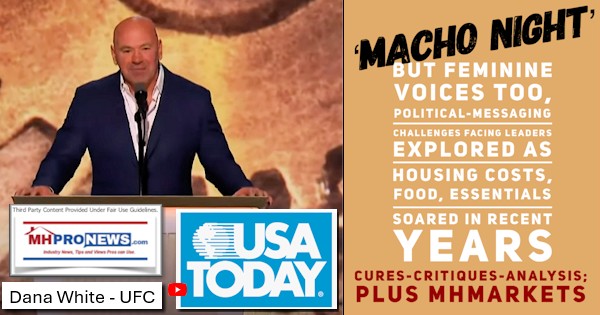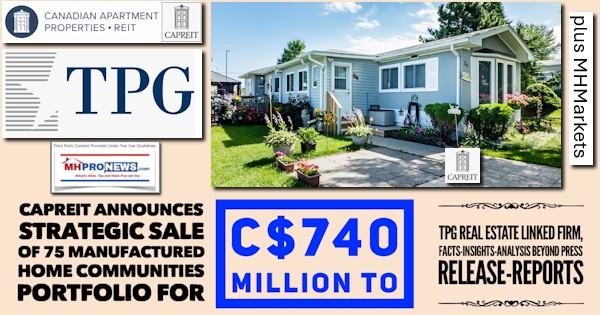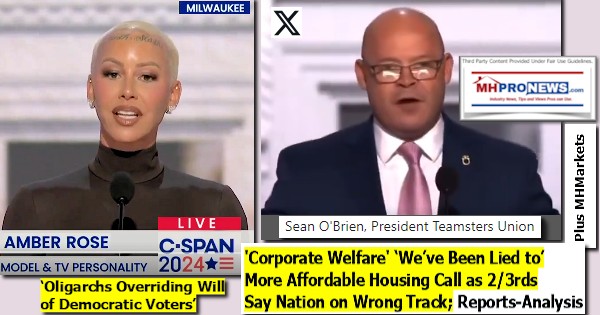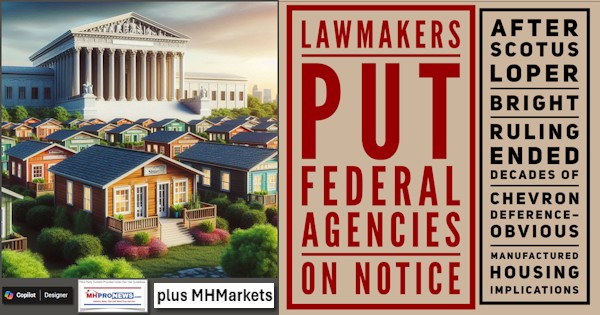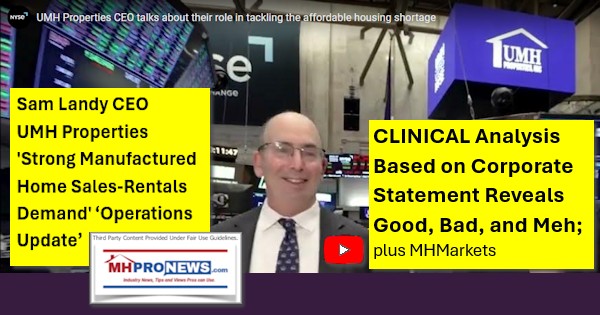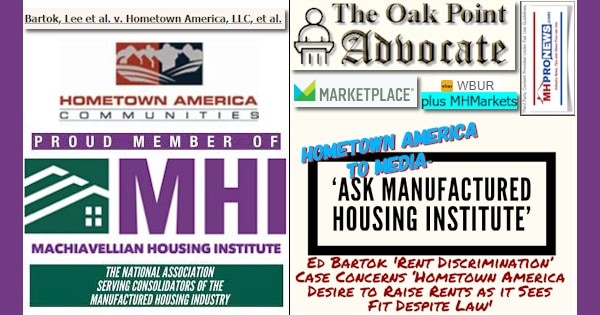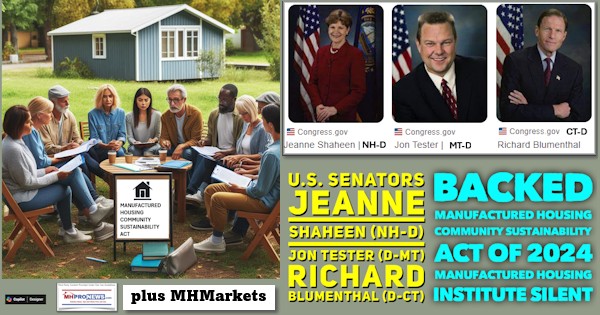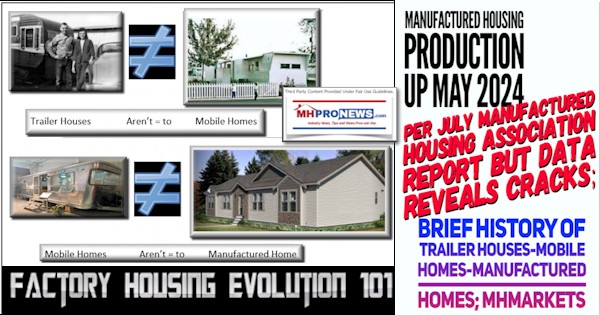To tee up the context for the headline topic, an email from the Federal Housing Finance Agency (FHFA), which is the regulator for the Government Sponsored Enterprises (GSEs of Enterprises) of Fannie Mae and Freddie Mac, had the following notice.
“FHFA is seeking public input on the Enterprises’ proposed modifications to their Underserved Markets Plans in 2020 and proposed 2021 activities and objectives. The 30-day public input period begins on Sept. 23 and ends on Oct. 23. The Request for Input and Enterprise submissions are available for download on the Duty to Serve home page. Select “submit” under the Public Input dropdown to submit your comments.”
Pursuant to that opportunity to comment was the following from media release on 10.21.2020 to MHProNews and the related comments letter from the Washington, D.C. based Manufactured Housing Association for Regulatory Reform (MHARR). That will be followed by their actual comments.
FOR IMMEDIATE RELEASE Contact: MHARR
(202) 783-4087
MHARR SUBMITS COMMENTS ON CONTINUING
DUTY TO SERVE IMPLEMENTATION FAILURES
Washington, D.C., October 21, 2020 – The Manufactured Housing Association for Regulatory Reform (MHARR) has filed comments (copy attached) regarding proposed revisions and a one-year (2021) extension period for Duty to Serve Underserved Markets (DTS) Implementation Plans previously filed by mortgage giants Fannie Mae and Freddie Mac.
In its comments, responding to a September 23, 2020 “Request for Information” (RFI) published by Fannie and Freddie’s federal regulator, the Federal Housing Finance Agency (FHFA), MHARR – as it did at a recent FHFA “Listening Session” – maintains that the so-called “implementation” of DTS within the manufactured housing market to date has been a failure which has severely prejudiced both the industry’s smaller businesses as well as American consumers of affordable housing. MHARR’s comments, accordingly, call on FHFA to scrap its current baseless and ineffective approach to DTS and instead, within a very brief time, take action to fully implement DTS in a market-significant manner across all sectors of the mainstream manufactured housing market.
MHARR will continue to focus on the full and faithful implementation of DTS for mainstream, affordable manufactured housing going forward, with both Congress and the Administration.
The Manufactured Housing Association for Regulatory Reform is a Washington, D.C.-based national trade association representing the views and interests of independent producers of federally-regulated manufactured housing.
— 30 –
As noted above, the following is the actual comments letter submitted by Mark Weiss, J.D., President and CEO of the MHARR on the topic of DTS and the language of FHFA the “Enterprises’ proposed modifications to their Underserved Markets Plans in 2020 and proposed 2021 activities and objectives.”
Their MHARR comments letter will be followed by additional linked information from MHProNews.
October 21, 2020
VIA FEDERAL EXPRESS
Ms. Rebecca Cohen
Senior Policy Analyst
Attention: Duty to Serve 2020-2021 RFI
Federal Housing Finance Agency
Eighth Floor
400 Seventh Street, S.W.
Washington, D.C. 20219
Re: Duty to Serve Underserved Markets – Proposed 2020 Plan Modifications and 2021 Plan Extension
Dear Ms. Cohen:
The following comments are submitted on behalf of the Manufactured Housing Association for Regulatory Reform (MHARR). MHARR is a Washington, D.C.-based national trade association representing the views and interests of manufactured housing producers subject to federal regulation pursuant to the National Manufactured Housing Construction and Safety Standards Act of 1974 as amended by the Manufactured Housing Improvement Act of 2000 (42 U.S.C. 5401, et seq.). MHARR was founded in 1985. Its members include smaller and medium-sized independent producers of manufactured housing from all regions of the United States.
INTRODUCTION
On September 23, 2020, the Federal Housing Finance Agency (FHFA) published, for public comment, proposed modifications to the 2018-2020 Fannie Mae and Freddie Mac Duty to Serve Underserved Markets (DTS) implementation plans previously approved by FHFA, as well as proposed DTS Implementation Plan extensions for 2021.[1]The DTS provision of the Housing and Economic Recovery Act of 2008 (HERA) directs Fannie Mae and Freddie Mac to “develop loan products and flexible underwriting policies” to, among other things, “facilitate a secondary market for mortgages” and personal property, or “chattel” loans, “on manufactured homes for very low, low and moderate-income families.” As MHARR has consistently stressed since HERA was enacted, DTS was designed by Congress to provide a specific statutory remedy for the long-term failure of the Government Sponsored Enterprises (GSEs) to properly serve the affordable, mainstream manufactured housing market and the mostly lower and moderate-income consumers who rely on inherently-affordable manufactured housing.
The promise of DTS for the vast majority of those consumers, however, has been undermined, almost completely, by FHFA “implementation” policies that have allowed Fannie Mae and Freddie Mac to baselessly delay – and, indeed, fail to provide any DTS support whatsoever — for the largest single segment of the manufactured housing loan market, while diverting DTS to more-costly “hybrid”-type homes currently produced only by one or two of the industry’s largest corporate conglomerates, that are not affordable for the vast majority of manufactured homebuyers. As a result, some twelve years following the enactment of DTS, Fannie Mae and Freddie Mac still do not serve some 94-95 percent of the HUD Code manufactured housing market. Even worse, as a result of this failure, lower and moderate-income manufactured homebuyers are effectively forced into higher-rate loans provided, in substantial part, by the finance-affiliates of the same dominant corporate conglomerates. Put simply, then, the implementation of DTS within the manufactured housing market – as continued by the latest proposed plans – is an unacceptable failure, which demands a remedy, either administratively through FHFA, or legislatively, through Congress.
COMMENTS
FHFA’s failure to ensure full and faithful DTS implementation, continuing through the proposed revised 2020 plans and 2021 extension period, is demonstrated by statistics contained in FHFA’s own DTS “dashboard,” as well as information highlighted in related Fannie Mae and Freddie Mac DTS reports. From that data, four key facts emerge, which illustrate FHFA’s failure to faithfully implement DTS in relation to DTS and the mainstream HUD Code market.
First, manufactured home personal property or “chattel” loans, provide consumer financing for the industry’s most affordable mainstream homes. As a result, according to U.S. Census Bureau data, such personal property consumer loans currently constitute some 76% of all new manufactured home placements and, as recently as 2015, constituted a full 80% of all U.S. manufactured home placements, according to the same Census Bureau survey.[2] Nevertheless, Fannie Mae and Freddie Mac, with FHFA’s acceptance and approval, still – some twelve years after the enactment of DTS — have no loan purchase programs whatsoever for manufactured housing personal property loans and no plans for any such programs within the 2021 extension period or any time within the foreseeable future. Even worse, the minimal personal property “pilot” program previously proposed by Freddie Mac for 2019 and 2020 is eliminated under the proposed 2020 Plan modifications and is absent from Freddie Mac’s 2021 DTS Implementation Plan extension proposal.
Fannie and Freddie, accordingly, propose to leave the largest single segment of the manufactured housing consumer loan market – representing the industry’s most affordable homes — completely unserved under DTS through the entirety of the 2020-2021 DTS Plan period. By the end of the 2021 extension period, therefore – and absent some other action by FHFA – thirteen years will have passed since the enactment of DTS, with the overwhelming majority of the federally-regulated manufactured housing market and manufactured housing consumers left completely unserved by Fannie Mae and Freddie Mac under DTS. Meanwhile, FHFA has – and continues – to provide misleading reports and certifications to Congress that the Enterprises are complying with the DTS mandate when, in the case of manufactured housing, they clearly are not.
Second, while Fannie Mae and Freddie Mac have purchased loans for manufactured homes titled as real estate for DTS credit, the real estate segment of the overall manufactured housing market, in and of itself, is quite small, constituting, at most, 19% of the total market, according to Census Bureau data and as little as 13% of manufactured housing market as recently as 2014, according to the same Census Bureau survey.[3] The relatively small market portion of those DTS real estate loans, moreover, is further extenuated by the fact that of the loans purchased by Fannie Mae and Freddie Mac for DTS credit since 2017, only 30 to 34% have been for new home purchases.[4]
Thus, purchases of manufactured housing real estate loans by both Fannie Mae and Freddie Mac, constituted just 5% of the new HUD Code market in 2017, 5.78% of the new HUD Code market in 2018, and just 6.46% of the new HUD Code market in 2019. Conversely, that left 93% of the new HUD Code market completely unserved in 2019, and more than 94% of the new HUD Code market completely unserved in both 2018 and 2017. Yet that wholly inadequate figure – more than a decade after the enactment of DTS — is misleadingly and without factual basis, deemed to be full “compliance” with DTS by FHFA in reports and certifications to Congress. This is utterly absurd.
Third, DTS compliance reports submitted to FHFA by Fannie Mae and Freddie Mac show that purchases of new “MH Advantage” and “ChoiceHome” loans (referred to as “Cross-Mod” homes by the manufactured housing industry’s largest corporate conglomerates and their national organization, the Manufactured Housing Institute) and condescendingly described by Fannie and Freddie as an “enhanced manufactured housing loan product for quality manufactured housing” (emphasis added) (falsely implying that mainstream manufactured homes constructed to the exact same federal building code are somehow not “quality” homes),[5] respectively were either minimal or non-existent through the entire 2017-2020 reporting period. Moreover, no new or additional purchases under these programs is proposed or planned during the 2021 Implementation Plan extension period, further demonstrating their status as a mere diversionary tactic.
Freddie Mac, accordingly, purchased zero “ChoiceHome” manufactured home loans during the 2017-2020 reporting period, while Fannie Mae, in 2019, “purchased six MH Advantage loans, of which two were eligible for DTS credit.”[6] (Emphasis added). MH Advantage/ChoiceHome activity in 2019 thus represented 0.002% of the total new HUD Code market. Moreover, Fannie Mae, in its proposed 2020 DTS Implementation Plan modifications, seeks permission to “replace loan purchases” under its MH Advantage program, with “expanded outreach and education activity.”[7] Consequently, it appears there will be no MH Advantage or ChoiceHome purchases through 2020.
This failure was not only completely predictable, but exposes a conscious and deliberate effort by FHFA to sanction and countenance ongoing activity by Fannie Mae and Freddie Mac to distort, misdirect, divert and fundamentally undermine the legitimate and laudable purposes of DTS.
At the most basic level, the failure of the MH Advantage and ChoiceHome programs to produce any significant results, precisely mirrors Fannie Mae’s failed pre-DTS “MH Select” program. That program, with requirements and supposed benefits very similar to MH Advantage, produced exactly zero originations over its life-span. It was thus entirely predictable that a substantially similar program – offering alleged support for homes costing two to three times that of a typical mainstream manufactured home – would likewise fail, as has been the case with MH Advantage, ChoiceHome homes. Among other things, this demonstrates that both Fannie and Freddie – and FHFA as their federal regulator – have learned nothing from history and, more specifically, their prior mistakes (including not only “MH Select,” but the subprime debacle as well). It also demonstrates, moreover, the Enterprises’ outright rejection of mainstream manufactured housing, and their parallel lack of interest in taking any market-significant action to advance the availability of cost-competitive consumer financing for those homes and those consumers.
DTS, moreover, was not mandated by Congress to provide enhanced Enterprise support for a much more costly and much less affordable specialty “hybrid” product that — while providing an ostensible, quasi-site-built-housing “comfort zone” for Fannie Mae, Freddie Mac and FHFA, has been consistently rejected by the market. To the contrary, DTS was specifically designed to provide consumer financing support for mainstream, affordable, HUD Code manufactured homes, Indeed, nowhere does DTS state or even hint that it constitutes a license for FHFA, Fannie Mae, or Freddie Mac functionaries to act as de facto architects, engineers, landscapers, or community planners in deciding, for – and in the place of – real consumers, what types of amenities or features should be included in a home. This represents a type of prejudice and discrimination that is indefensible and ultimately both pointless and unavailing in a free market.
Further, it is unconscionable for any federal agency, such as FHFA, or any federally-backed organization, such as Fannie Mae and Freddie Mac, to not only fail to implement a remedial federal law and mandate like DTS over the course of more than twelve years, but worse yet, to adopt and implement a distortion and diversion of DTS – which MH Advantage and ChoiceHome are – in order to discriminate against smaller industry businesses and consumers of the industry’s most affordable homes.
Fourth, according to data referenced and reported by Freddie Mac itself, in the absence of meaningful, market-significant DTS support for the mainstream, affordable manufactured housing market, “more than 90%” of the manufactured housing personal property loans reported in the 2018 Home Mortgage Disclosure Act (HMDA) data compiled by the federal government, were “higher-cost originations.”[8]
This data confirms a crucial point that MHARR has long asserted regarding DTS and the failure of FHFA to require its full and faithful implementation, as written, for mainstream, affordable manufactured homes – i.e., that the absence of full and legitimate DTS implementation across the entire manufactured housing market, and particularly its dominant personal property financing sector, effectively forces consumers who are not otherwise excluded from the market, to obtain financing from one of the handful of conglomerate-affiliated “portfolio” lenders, at a higher interest rate than would otherwise be the case in a fully-competitive market with DTS support from Fannie Mae and Freddie Mac. These “portfolio” financing operations have thus been – and continue to be – the primary beneficiaries to date of FHFA’s failed implementation policies within the manufactured housing market. Effectively then, Fannie, Freddie and FHFA are accessories in maintaining a less-than-fully competitive manufactured housing consumer financing market, maintaining needlessly higher-interest rates within that market, discriminating in favor of the industry’s largest corporate conglomerates and their financing affiliates at the same time that they discriminate against smaller industry businesses and consumers, all while subjecting consumers to such higher costs or completely excluding others from the housing market altogether.
The upshot of all this after twelve years, is that the approach to DTS taken by Fannie Mae and Freddie Mac, and approved and supported by FHFA as their federal regulator, and the federal agency entrusted by the law with implementing DTS, has failed, as is shown by the relevant facts and statistics. Serving just a fraction of one small segment of the industry, while leaving the industry’s most affordable homes completely unserved, cannot legitimately be understood as representing compliance, or even partial or “good faith” compliance with DTS, and should not be misrepresented to Congress as such.
Given this failure by FHFA to properly and faithfully implement DTS within the mainstream manufactured housing market for more than a decade, it is no surprise whatsoever, that sales of new manufactured homes – due in part to the unavailability of price-competitive consumer financing, particularly within the chattel market – is, and for more than a decade, has been, far below historical industry norms. Worse yet, industry production and sales actually declined in 2019, and are poised to decline again in 2020, if current market trends remain in place.[9] This is notwithstanding significant sales growth in other segments of the housing market and a continuing affordable housing crisis.
Thus, as MHARR has consistently maintained, the lack of DTS support for the overwhelming majority of HUD Code manufactured housing purchasers, means that those consumers are being subject to baseless discrimination not only by Fannie and Freddie, but also by FHFA as the Enterprises’ federal regulator, resulting in higher interest rates than would be the case in a fully-competitive market with DTS support, while untold numbers of otherwise qualified manufactured housing purchasers are being excluded from both the HUD Code market and homeownership altogether by the lack of DTS support in direct contravention of both the letter and purpose of the DTS statute. Meanwhile, the primary beneficiaries of this absence DTS support for the mainstream manufactured housing market, are the portfolio lenders affiliated with the industry’s largest corporate conglomerates which arguably dominate a market that is – and has been — less than fully-competitive due to the absence of GSE securitization and secondary market support.
Years ago, when DTS was first enacted, the excuse de jour from Fannie, Freddie, and FHFA, as well, for totally ignoring and failing to support the HUD Code personal property consumer loan market under DTS, was an alleged “lack of information” on the performance of such loans. Whether that was true and accurate at the time is unknown, because of the unavailability of Freedom of Information Act (FOIA) access to Fannie Mae and Freddie Mac documents. But, that is not the case any longer, as is shown by Freddie Mac’s recent report on “Manufactured Home Loan Performance (For Originations Between 2009 and 2019).” Given that data, there is no longer any basis or excuse – if there ever was one to begin with – for the Enterprises to continue to refuse DTS support for the vast majority of manufactured home loans.
CONCLUSION
Ultimately, FHFA has allowed Fannie Mae and Freddie Mac to evade the DTS statutory mandate with respect to federally-regulated manufactured housing based on excuses and dodges that are both disingenuous and outrageous, and have been debunked time and again by MHARR for more than a decade. Indeed, given indications that both Fannie and Freddie have had access to manufactured housing consumer loan performance data for some time, it appears more and more likely that their extended failure to fully and faithfully implement DTS with respect to manufactured housing is a scandal that has played-out right in front of FHFA regulators.
FHFA is responsible for fully and faithfully enforcing the DTS law as written. It is not the function of FHFA to look the other way when Fannie and Freddie either ignore the DTS mandate, or affirmatively discriminate against the industry’s smaller businesses as well as mainstream manufactured housing consumers. Indeed, it is incongruous how FHFA, as a federal agency sworn to faithfully uphold the law, can: (i) permit such misconduct by the parties it is responsible for regulating and do nothing to correct that misconduct; and (ii) misrepresent that misconduct to Congress by certifying that those same regulated entities are, supposedly, in “compliance” with the law when they clearly are not.
FHFA, accordingly, should immediately begin an internal investigation to determine how DTS implementation within the manufactured housing market has been allowed to remain stagnant for more than twelve years. It should simultaneously structure and implement – within a short and finite timeframe (not another wasted twelve years) — a new, legitimate and effective DTS implementation program for the entire mainstream manufactured housing market for the benefit of all industry and consumer stakeholders, while rejecting any approach, like the present failed approaches, which effectively seek to choose winners and losers in a manner that is inconsistent with a free market.
MHARR, for its part, is committed to ensuring the full and faithful implementation of DTS within the mainstream manufactured housing market, and reserves its right to seek appropriate remedies from the Administration, or Congress, or both, as necessary, in the event that FHFA does not reverse and correct the travesty that has played out under DTS for more than a decade.
Sincerely,
Mark Weiss
President and CEO
cc: Members, House Financial Services Committee
Members, Senate Banking, Housing and Urban Affairs Committee
Hon. Russell Vought (OMB)
Hon. Mark Calabria
###
Footnotes for MHARR’s letter are as follows.
[1] See, Federal Housing Finance Agency Request for Input on Fannie Mae and Freddie Mac 2018-2020 Duty to Serve Plan Modifications and 2021 Extensions (September 2020) at p. 3.
[2] See, Attachment 1, hereto, U.S. Census Bureau, Cost and Size Comparisons: New Manufactured Homes and New Single-Family Site-Built Homes (2014-2019).
[3] Id.
[4] See, FHFA DTS Dashboard.
[5] See, e.g., Fannie Mae Proposed 2020 Manufactured Housing Duty to Serve Implementation Plan Revisions (For Manufactured Homes Titled as Real Property), at p. 1 of 2.
[6] See, Fannie Mae 2019 Manufactured Housing Loan Product Report, at p. 5 of 7: “In 2019 we purchased six MH Advantage loans, of which two were eligible for Duty to Serve Credit.”
[7] See, Fannie Mae Proposed 2020 Manufactured Housing Duty to Serve Implementation Plan Revisions (For Manufactured Homes Titled as Real Property) at p. 1 of 2: “Proposed Modification: Replace loan purchases with expanded outreach and education activity.”
[8] See, “Manufactured Home Loan Performance (For Originations Between 2009 and 2019),” Freddie Mac (2020) at p. 7 (Part 3.1).
[9] According to data assembled by the U.S. Department of Housing and Urban Development, 94,615 manufactured homes were produced in the United States in 2019, down 2% from the 96,555 manufactured homes produced in 2018. Through August 2020 (the last month for which production statistics were available, a total of 61,583 manufactured homes were produced. This compares with 62,463 during the same period in 2019, representing a further year-over-year decline of 1.4%, all in the face of an affordable housing shortage.
###
There will be a planned special report by MHProNews upcoming soon on financing and related topics. Let’s note for now that several outside groups as well as industry insiders have contacted MHProNews about keen insights that impact on these issues. Stay tuned, and if you aren’t already on our industry-leading x2 weekly emailed headlines news, sign up in seconds below. Professionals, investors, government officials, mainstream media, and others are among our list of highly engaged readers.

There is always more to read and more to come. Stay tuned with the runaway number one source for authentic “News through the lens of manufactured homes and factory-built housing” © where “We Provide, You Decide.” © ## (Affordable housing, manufactured homes, reports, fact-checks, analysis, and commentary. Third-party images or content are provided under fair use guidelines for media.) (See Related Reports, further below. Text/image boxes often are hot-linked to other reports that can be access by clicking on them.)

By L.A. “Tony” Kovach – for MHProNews.com.
Tony earned a journalism scholarship and earned numerous awards in history and in manufactured housing.
For example, he earned the prestigious Lottinville Award in history from the University of Oklahoma, where he studied history and business management. He’s a managing member and co-founder of LifeStyle Factory Homes, LLC, the parent company to MHProNews, and MHLivingNews.com.
This article reflects the LLC’s and/or the writer’s position, and may or may not reflect the views of sponsors or supporters.
Connect on LinkedIn: http://www.linkedin.com/in/latonykovach
Related References:
The text/image boxes below are linked to other reports, which can be accessed by clicking on them.
Hopeful News! Builder Confidence Grows, Views from Mainstream and Manufactured Housing










